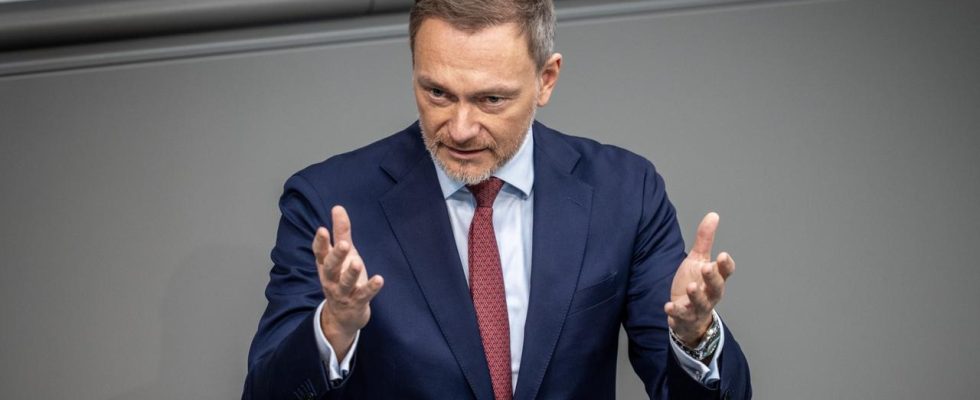analysis
At the start of the budget week in the Bundestag, Finance Minister Lindner points out the intensive discussions in advance. And adds: It was worth it. The opposition parties have a completely different opinion.
The debate starts late. “The gong is broken, the microphone doesn’t work – it’s working,” says Bundestag President Bärbel Bas with a wink – that must be due to the budget deliberations. The scene is symptomatic of the preparation of this year’s federal budget. Because that too is coming late – it should have been decided on for weeks.
However, with its decision on the debt brake, the Federal Constitutional Court “caught the traffic light coalition off guard,” as the Green politician Sven-Christian Kindler admitted in the budget debate. Hectic debates ensued as to which components of the budget could be affected.
A supplementary budget was quickly drawn up for 2023 and the debt brake was suspended once again. Energy price support that had already been paid was thus placed on a legally secure basis.
But due to higher spending, for example on citizens’ money and Ukraine, billions were also missing from the budget for 2024. Finance Minister Christian Lindner initially estimated the budget gap at 17 billion euros. The hole later turned out to be significantly smaller, but the traffic light’s decisions to provide counter-financing had already caused massive protests – especially from farmers.
Union criticizes the increase in the budget
From the perspective of the CDU/CSU parliamentary group, these resolutions show that the traffic light coalition was not interested in saving money at all. The budget will only be balanced through higher taxes and dipping into reserves, criticizes budget policy spokesman Christian Haase: “They have shaken and shaken every little tree so that money falls down somewhere.” Farmers, winegrowers and entrepreneurs in rural areas paid the bill, says Haase.
The Union’s main argument, which is likely to run through the budget week: Compared to the period before the corona pandemic, the budget has grown massively, with an increase of around 34 percent, significantly stronger than economic output, which grew by almost 19 percent in the same period is, as parliamentary group deputy Mathias Middelberg explains.
This is due to the strong increase in personnel in public administration as well as higher social benefits such as citizens’ benefit, says Middelberg. He concludes: “We live massively beyond our means.”
The AfD goes one step further: its budget spokesman Peter Boehringer accuses the traffic lights of concealing the amount of debt. He therefore considers the budget to be unconstitutional. However, in order to achieve the quorum for a regulatory action, the AfD would need the votes of the Union, which is not sending any signals in this direction, although it itself has constitutional concerns.
Replacement investments for Ukraine aid are to be paid from the special fund for the Bundeswehr. CDU householder Haase doubts whether this is compatible with the corresponding regulation in the Basic Law. However, not every constitutional doubt automatically leads to a lawsuit in Karlsruhe.
SPD: Welfare state as a bulwark
The budget politicians from the SPD and the Greens have a completely different focus in the debate: They acknowledge the large demonstrations against right-wing extremism in the country – and see their own measures as a contribution to strengthening democracy. The best bulwark against enemies of democracy is the welfare state, emphasizes SPD politician Dennis Rohde, who uses this to defend increases in citizens’ benefits and other social benefits.
The Green Sven-Christian Kindler points to the reversal of cuts in voluntary services, migration advice, political education and volunteer work: “This is the backbone of our democracy, this is the best protection of our constitution. That is why we are strengthening it with this budget. “
Lindner’s double message
Finance Minister Lindner, in turn, goes into the debate with a double message: In line with his traffic light partners, the SPD and the Greens, he acknowledges the compromises that have been found and particularly emphasizes the higher investments “for roads, rail and digital networks”. At the same time, to emphasize that this is possible without suspending the debt brake again.
This is not only a requirement of the constitution, but also of economic reason, says the FDP chairman, referring to the state’s recent significant increase in interest expenses.
At this point it can be guessed that the coming budget is also likely to cause internal traffic light discussions. There is already a gap between income and expenditure in the double-digit billion range.
Especially since the economy continues to weaken, as the current figures from the Federal Statistical Office show: in the final quarter of 2023, gross domestic product fell again by 0.3 percent. And the lower the growth, the lower the tax revenue.
Debt brake: No convergence visible
In particular, the different positions on the debt brake are likely to continue to be a topic of discussion. Now the so-called economists have also called for the debt brake to be relaxed, which could put Finance Minister Lindner and his FDP in the coalition under further pressure.
However, reforming the debt brake would require a two-thirds majority in the Bundestag and Bundesrat – and thus the approval of the CDU and CSU. However, this is not apparent. The budget debate has also shown that neither the traffic light parties are approaching the Union nor the Union parties are approaching the traffic lights.

